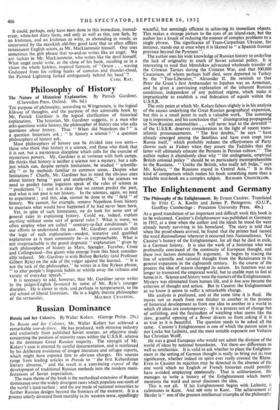Philosophy of History
The Nature of Historical Explanation. By Patrick Gardiner. (Clarendon Press, Oxford. 10s. 6d.) THE purpose of philosophy, according to Wittgenstein, is the logical Kla rung of thoughts, and the purpose of this admirable book by Mr. Patrick Gardiner is the logical clarification of historical explanation. The historian, Mr. Gardiner suggests, is a man who asks questions within history, the philosopher of history one who asks questions about history. Thus " When did Napoleon die ? " is a question historians ask ; " Is history a science ? " a question philosophers of history ask. Most philosophers of history can be divided into two sorts— those who think that history is a science, and those who think that it is not, but a mysterious discipline which calls for the exercise of mysterious powers. Mr. Gardiner is at variance with both camps. He thinks that history is neither a science nor a mystery, but a sub- ject which can, despite certain limitations, be studied " scientific- ally " or by methods familiar to common sense.- Despite what limitations ? Chiefly, Mr. Gardiner has in mind the obvious ones about history being " past and unalterable." In the sciences we need to predict (some logicians speak of the rules of science as " predictions ") ; and it is clear that we cannot predict the past, and what is not past is not history. In the sciences, again, we need to experiment ; and this, alas, cannot be done in the " field " of history. We cannot, for example, remove Napoleon from history to ascertain what would have happened if he had never been born.
Yet, in spite of such limitations, we do look for some sort of general rules in explaining history. Could we, indeed, explain anything without some sort of general rules ?. What is more, we often employ what are called " contrary-to-fact conditionals " in our efforts to understand the past. Mr. Gardiner assures us that the logic of such explanation—modest, tentative and qualified explanation as it must commonly be—is irreproachable. What is not irreproachable is the grand dogmatic " explanation " given by such philosophers of history as Marx, Spengler, Toynbee, Croce and Collingwood—five giants who emerge from this book consider- ably reduced. Mr. Gardiner is with Bishop Berkeley (and Professor Gilbert Ryle) on the side of the vulgar against the learned. " It is not the task of the philosopher," he writes in a fine Rylean phrase, " to alter people's linguistic habits or whittle away the richness and variety of everyday speech." It is necessary to add, however, that Mr. Gardiner never writes in the pidgin-English favoured by some of Mr. Ryle's younger disciples. He is closer in style, and perhaps in temperament, to the old school of liberal historians. He is a highly literate philosopher


































 Previous page
Previous page